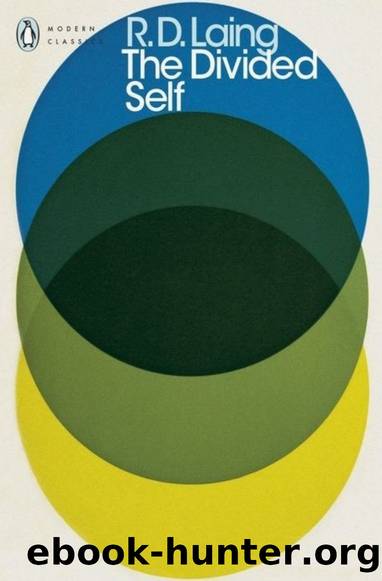The Divided Self by R.D. Laing

Author:R.D. Laing [Laing, R.D.]
Language: eng
Format: epub
ISBN: 9780141962085
Google: 4JT-12rMtJsC
Barnesnoble:
Publisher: Penguin Books Ltd
Published: 2012-10-01T00:00:00+00:00
It may be that here is a biological analogue for many anxieties about being obvious, being out of the ordinary, being distinctive, drawing attention to oneself, where the defences employed against such dangers so often consist in attempts to merge with the human landscape, to make it as difficult as possible for anyone to see in what way one differs from anyone else. Oberndorf (1950), for instance, has suggested that depersonalization is a defence analogous to âplaying possumâ. We shall consider these defences in some detail in the case of Peter (Chapter 8).
Being like everyone else, being someone other than oneself, playing a part, being incognito, anonymous, being nobody (psychotically, pretending to have no body), are defences that are carried through with great thoroughness in certain schizoid and schizophrenic conditions.
The above patient became frightened when she had blended with the landscape. Then, in her words: âI would repeat my name over and over again to bring me back to life, so to speak.â This raises an important issue. I think that it would be a correct conjecture to suppose that the particular form of defence against anxiety in this little girl could only have arisen from a shaky ontological foundation. A securely established sense of identity is not easily lost, not as readily as this girl of twelve was able to lose hers in her game. It is, therefore, probable that this very ontological insecurity at least partly occasioned her anxiety in the first place and that she then used her source of weakness as her avenue of escape. This principle has been seen operating already in the cases of James, David, Mrs D., and others. In blending with the landscape, she lost her autonomous identity, in fact she lost her self and it was just her âselfâ that was endangered by being alone in the gathering dusk in an empty expanse.
The most general expression of this principle is that when the risk is loss of being, the defence is to lapse into a state of non-being with, however, all the time the inner reservation that this lapsing into non-being is just a game, just pretending.
As Tillich (1952, p. 62) writes: âNeurosis is the way of avoiding non-being by avoiding being.â The trouble is that the individual may find that the pretence has been in the pretending and that, in a more real way than he had bargained for, he has actually lapsed into that very state of non-being he has so much dreaded, in which he has become stripped of his sense of autonomy, reality, life, identity, and from which he may not find it possible to regain his foothold âinâ life again by the simple repetition of his name. In fact this little girlâs game got out of hand in this way. When the patient wrote her account of her life, from which the above quotation is taken, she had remained severely depersonalized for a number of years.
In this region everything is paradoxical. In Chapter 5 we stated that the self dreads as well as longs for real aliveness.
Download
This site does not store any files on its server. We only index and link to content provided by other sites. Please contact the content providers to delete copyright contents if any and email us, we'll remove relevant links or contents immediately.
Should I Stay or Should I Go? by Ramani Durvasula(7649)
Why We Sleep: Unlocking the Power of Sleep and Dreams by Matthew Walker(6694)
Fear by Osho(4727)
Flow by Mihaly Csikszentmihalyi(4684)
Rising Strong by Brene Brown(4448)
Why We Sleep by Matthew Walker(4432)
The Hacking of the American Mind by Robert H. Lustig(4368)
How to Change Your Mind by Michael Pollan(4353)
Too Much and Not the Mood by Durga Chew-Bose(4333)
Lost Connections by Johann Hari(4169)
He's Just Not That Into You by Greg Behrendt & Liz Tuccillo(3878)
Evolve Your Brain by Joe Dispenza(3665)
The Courage to Be Disliked by Ichiro Kishimi & Fumitake Koga(3477)
Crazy Is My Superpower by A.J. Mendez Brooks(3394)
In Cold Blood by Truman Capote(3374)
Resisting Happiness by Matthew Kelly(3336)
What If This Were Enough? by Heather Havrilesky(3302)
The Book of Human Emotions by Tiffany Watt Smith(3289)
Descartes' Error by Antonio Damasio(3270)
